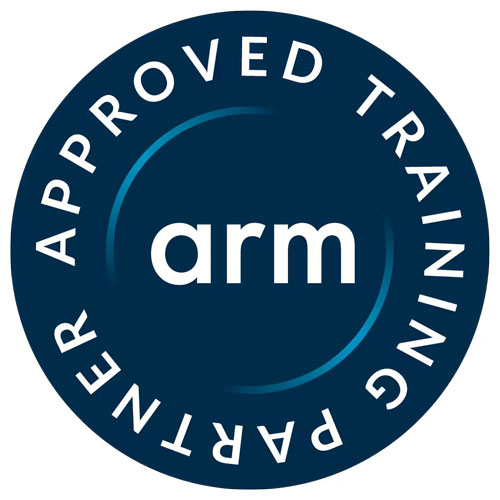Introduction to the Arm Architecture
Architecture versions • Registers and instruction sets • Exception model • Memory model • Coprocessors • Architecture extensions • The Future
Cortex-A7 Overview
Introduction • New Features in Cortex-A7 • big/LITTLE Processing
ArmV7-A/R ISA Overview
Load/Store • Data Processing • Flow Control • Misc • DSP
Exception Handling
Introduction • Interrupts • Abort Handlers • SVC Handlers • Undef • Handlers • Reset Handlers
Caches and Branch Prediction
Caches basics • Arm Cache example • L1 and L2 Cache Interactions • Caching policies • Inner and Outer Caches • Cache Determinism • Maintenance and Coherency • Branch Prediction
Cortex-A7 Cache Coherency
L1 & L2 cache coherency and maintenance • MPCore • coherency
Synchronization
Introduction to atomicity • Load exclusive and store exclusive instructions • Code examples • Multi-core, coherency • Exclusive reservation granule
Memory Management
Short-descriptor Format • Long-descriptor Format • Memory Types and Attributes • Using the MMU
Understanding Barriers
Data barriers • Instruction barriers
Cortex-A Power Management
Arm core power modes • Power control • Arm multi-core processor power modes • Power state coordination
Booting a Cortex-A7 processor
Overview • Booting a single CPU • Booting a cluster
Embedded Software Development
Semihosting / retargeting • Mixing C/C++ and assembly • Application Startup • Tailoring image memory map to your target • Accessing memory mapped peripherals • Additional considerations
OS Support
Multi-Processing • Translation tables • Context switching • Timers
GICv1 & GICv2 Programming
Distributor and CPU Interfaces • How to enable and configure interrupts • How to handle interrupts • How to send software interrupts • Security Extensions
TrustZone
Why do we need a Secure environment? • Armv7-A Security Extensions • Software • Memory System • Debug
NEON Overview
Introduction • NEON Instruction Set Overview • NEON Software Support
Debug
Invasive Debug • Non-Invasive Debug • PMU • Trace
GNU Compiler Hints and Tips
Basic Compilation • Compiler Optimizations • Coding Considerations • Local and Global Data Issues
GNU Linker Hints and Tips
Linking Basics • System and User Libraries • Linker Script • Veneer and Interworking • Linker Optimizations and Diagnostics • GNU Embedded Development Libraries
Appendix
Cross-Cluster MP Programming
Introduction • Multi-Cluster Configurations • Miscellaneous Considerations
Virtualization
Overview of Virtualization Extensions • Memory Management • Exception handling




